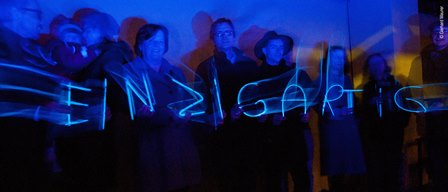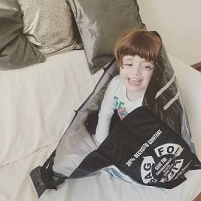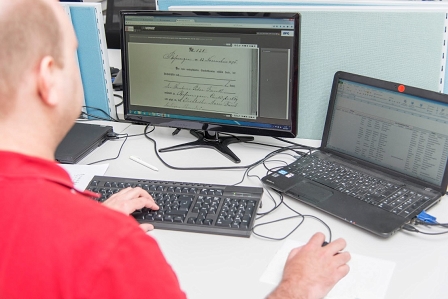Erstellt am: 1. 4. 2016 - 19:23 Uhr
Let's talk about autism
FM4 Reality Check
Hear the programme in the FM4 Player or subscribe to the podcast and get the whole programme after the show
"Wie ich in der Volkschule begonnen habe, habe ich gemerkt, dass ich eigentlich anders bin als andere," says Wolfgang, 31, who got his diagnosis just two years ago.
Nobody knows exactly how many people are affected by Autism Spectrum Disorder, as it's now known, but it's estimated that the prevalance rate is 1 to 2 percent of the population.
Last night thousands of buildings around the world lit up bright blue to mark World Autism Awareness Day on 2nd April. Most of us have heard the term "autism", but how many of us really know anything about it, or how it affects people’s lives?

Diakonie/Gerhard Maurer
Tova & Raphael
Tova’s son Raphael, who’s five years old, has autism. He loves to run around, to climb into the washing machine, to ride his bike. He also likes to stick to a certain routine, and doesn’t speak. Tova tells me concerns about Raphael’s development were first raised when he was 18 months old, when staff at his kindergarten noticed that he was unable to self-soothe and would have huge tantrums. A few months later they went to a diagnosis centre where they saw a neurologist, a speech therapist and a child psychologist and were give a "suspicion" of autism:

Tova Marr
"I was absolutely devastated. I had such a lack of understanding of what autism was. He went from being my little boy to suddenly being someone with autism and it totally changed. To give him a label is very difficult. We do use a label because we need to get the support that we have to get, but I like to see him as my son first. But definitely there was a moment of devastation, then there was mourning for what could be and then I kicked myself in the ass and realised that he’s amazing how he is."
What is Autism?
Autism is not an illness: it’s a "neurodevelopmental" disorder, meaning it's a condition which affects the development of the brain. It has a genetic component, generally becomes apparent very early in life and continues into adulthood. The latest medical definition, published in the United States in 2013, introduced the term Autism Spectrum Disorder, or ASD, an umbrella term to describe a range of conditions which had previously been diagnosed as separate disorders.
Professor Luise Poustka, the Head of the Department of Child and Adolescent Psychiatry at the AKH in Vienna, told me symptoms of autism are now grouped into two domains: "We have now: social communication difficulties, which is mainly difficulties in developing appropriate eye contact, in initiating or modulating social interaction via eye contact, problems with diminished facial expression, problems in recognising emotions in other people’s faces, a diminished set of gestures, and the main hallmark is reduced social reciprocity. The second domain, restricted and stereotyped activities comprises stereotyped language, special interests and motoric stereotypies - movements, like waving or flicking hands in front of the eyes."
Such movements are seen more in children who used to be labelled as childhood autistic children or mentally retarded children, and are less prominent in people with so-called "high functioning autism" - that’s the term used to describe people with an IQ over 70. And that highlights the point, says Professor Poustka, that autism is a highly heterogeneous disorder:
"We have on the one extreme individuals who can be mentally retarded, without any language or very poor language abilities, with highly stereotyped behaviours, and with a near lack of interest in interaction with other people, and on the other hand we can have individuals who have normal IQ, very good language abilities, who go to university, but still have subtle difficulties in managing complex interactions with other people, difficulties which are in sharp contrast to their cognitive abilities."
In other words, to say somebody has autism tells you very little about that person without further information. Or, as a renowned authority on autism put it: There are probably as many forms of autism as there are people with autism.
Wolfgang & Specialisterne
I met Wolfgang when I visited Specialisterne Austria, an initiative to help people with autism find secure and meaningful employment. The name means "the specialists" in Danish and was founded in Denmark by a man called Thorkil Sonne after his son was diagnosed with autism. The idea is that people with autism can be an asset to employers because of their particular talents, like an eye for detail or the ability to carry out repetitive tasks. And with support and coaching for the employer, the autistic employee and his or her new colleagues, as provided by Specialisterne, it functions rather like a specialised employment agency.

Walter Kvapil
Specialisterne also employs people on its premises, on a project to transcribe historical records written in gothic script into electronic documents. This is the project that Wolfgang works on. He describes how he "always knew he was different", and how he was bullied at college. Wolfgang tells me that when he was diagnosed with autism two years ago, he was relieved to finally have an explanation for why he was "different" and at the same time angry that he hadn’t been told this earlier. He enjoys the work at Specialisterne and because it’s a comfortable environment, he’s been there longer than in any other previous job.
Not enough support
It was a heartening experience to visit Specialisterne, but I also learned about the shortage of support for people with autism. Experts know that if children are given the right kind of support and training from an early age, they can benefit enormously, but this requires enough of the right kind of resources to be made available and at the moment they are in short supply.
Professor Poustka from the Department of Child and Adolescent Psychiatry at the AKH in Vienna summed it up like this:
"The first and basic problem is that many, many people have to pay a lot of money for getting a diagnosis, so it would be a huge improvement to provide more centres or practices which offer this on a normal insurance basis, and we are in discussions with the local Gebietskrankenkassa to improve the situation. Second - we need more people who are trained in providing early intervention to offer this for children who need it."
"There are many parents who do not have the resources to give proper support … I mean the changes through the lifetime… a child of three or four needs other support than a child of eight, then later fifteen. I think we need a really good 'Gesamtkonzept' for early recognition of autism, to getting things like Specialisterne who offer professional support, but only for high functioning individuals - but we need this for low functioning individuals as well."
"We know that 40 per cent of the costs, which are really high - about 2.5 million for every autistic individual over their lifetime - are the loss of the Bruttosozialprodukt because they don’t get into work, which they can. A higher percentage than we have now can work and earn their own money, which they want. So we need a 'Gesamtkonzept' which needs child psychiatrists, the Jugendhilfe, the health insurance to work properly together to help those people have a good start into adulthood".
More information on autism:
Getting Active
Tova isn’t going to sit around waiting for such a plan - she has taken matters into her own hands and is in the process of setting up her own autism centre. It’s planned as place where "there is a playroom, a coffee shop, as well as therapy opportunities and generally a community centre for parents and therapists, and children and adults with autism, so that there’s kind of a 'one stop' place to go. So that parents can stop feeling so alone, because I think people are incredibly isolated here in terms of what they get in support. So this would be a place where parents feel safe, and welcome. If you can provide a place where parents don’t have to book a babysitter - because getting a babysitter for a child with autism is almost impossible - it’s a place they can go, they can socialise and they have that opportunity to network with other parents."
Dieses Element ist nicht mehr verfügbar



